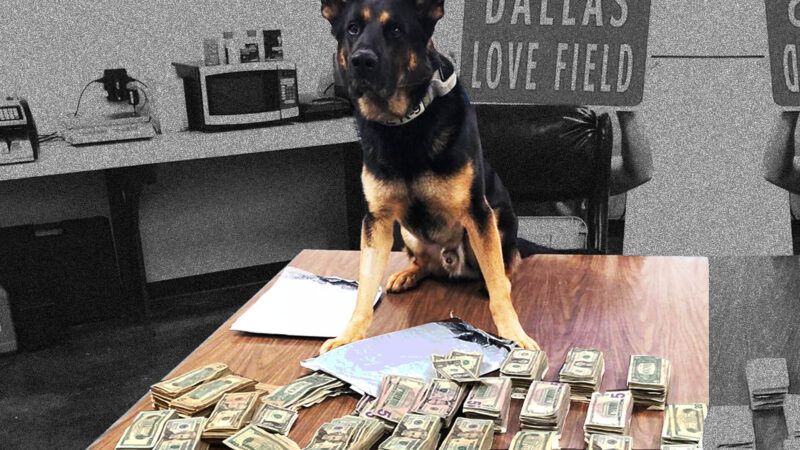Dallas Police Took $106,000 From a Traveler. They Haven't Explained Why.
A police dog's alert prompted the search, and the money was seized via civil asset forfeiture.

On Sunday, a Facebook post from the Dallas Police Department went viral. It depicts a police dog, Ballentine, who is a member of the department's interdiction unit, operating out of Dallas' Love Field Airport. The caption praises Ballentine for sniffing out more than $100,000 in cash from a traveler's bag.
What is left out of the description is what, if anything, the traveler did wrong.
When contacted by Reason, Dallas police declined to give any specifics. The only comment provided was a statement that the squad "seized $106,829.00, from a 25-year-old female who is a resident of Chicago, IL., but was travelling on a domestic flight… [Her suitcase] contained nothing but blankets and two large bubble envelopes containing the currency. The individual was not arrested at this time. However, the money was seized and will be subject to the civil asset forfeiture process."
Civil asset forfeiture is the practice by which law enforcement may take certain goods, including cash, if they are suspected to be tied to criminal activity. But in practice, officials do not even have to prove that a crime has been, or would be, committed. Legally, there is no limit on the amount of cash a traveler can carry on domestic flights, but forfeiture allows authorities to seize any amount they deem suspicious.
In most cases, the owner of the seized property faces no recourse but to file suit against the particular agency. Texas is no exception: According to the Institute for Justice (IJ), a libertarian public interest law firm, the standard of proof in Texas for police to seize property is simply "preponderance of the evidence," while "an innocent owner bears the burden of proving that she was not involved in any crimes associated with her property before she can get it back."
Texas law enforcement agencies additionally have a "strong incentive" to seize property, as they are entitled to a significant percentage of the proceeds. In fact, IJ is currently suing Harris County, which encompasses Houston, over its application of the state's asset forfeiture law.
Cops regularly use civil asset forfeiture to boost their own budgets while depriving innocent people of their property. Earlier this year, a Nevada Highway Patrol Officer confiscated a man's life savings during a routine traffic stop, even after admitting that it was "not illegal to carry currency." In Georgia, the state government agency charged with enforcing tax crimes misappropriated more than $5 million in seized funds between 2015 and 2020. And for years in Oklahoma, district attorneys used forfeitures like their own personal piggy banks, living for free in seized houses and paying off student loans with seized cash.
Jennifer McDonald, who works at IJ and authored the report "Jetway Robbery? Homeland Security and Cash Seizures at Airports," tells Reason that this Dallas case is "pretty typical" of forfeitures. According to IJ's research, McDonald says there is "very little evidence in the data that there is strong criminality tied to these seizures. In most cases, nobody is even arrested…If somebody is truly laundering money, or trafficking drug proceeds, or whatever it is that law enforcement alleges, wouldn't you think that there should at least be an arrest going on?"
As for the 25-year-old woman from Chicago, she was not detained and was allowed to continue on to her destination. Yet in order to recoup her seized funds, she will likely have to travel back to Dallas, retain an attorney, and argue in court that the money was not involved in criminal activity. In essence, she will have to prove a negative, and she will have to shoulder the costs for doing so, despite having already lost more than $100,000.
The fact that a person, with little warning, can have her property seized without being charged with a crime is bad enough. The idea that to get that property back, the burden would then fall to her to prove her own innocence, against a crime that was not charged, is unconscionable. Since Dallas police did not charge this traveler with a crime, they should give the money back—and then Texas legislators should rip out the state's forfeiture laws by the roots.


Show Comments (91)